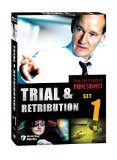| Reviews & Columns |
|
Reviews DVD TV on DVD Blu-ray 4K UHD International DVDs In Theaters Reviews by Studio Video Games Features Collector Series DVDs Easter Egg Database Interviews DVD Talk Radio Feature Articles Columns Anime Talk DVD Savant Horror DVDs The M.O.D. Squad Art House HD Talk Silent DVD
|
DVD Talk Forum |
|
|
| Resources |
|
DVD Price Search Customer Service #'s RCE Info Links |
|
Columns
|
|
|
Trial and Retribution - Set 1
When it sticks to the crime and punishment, it can't be beat. Acorn Media has released Trial and Retribution - Set 1, a collection of the first four "series" of the intense, complex British police procedural created and written by Lynda La Plante, the creator of the excellent Prime Suspect series. Starring David Hayman and Kate Buffery, Trial and Retribution may remind American viewers of our own, earlier-debuting Law and Order (which in turn looks suspiciously like 1960's NBC series, Arrest and Trial), where both the police track-down of the criminal, and then the criminal's fate in the dock, are examined. However, Trial and Retribution's 200-minute miniseries go much more deeply into the complexities of both the police investigations and the criminal trial, creating a dense, sometimes shockingly graphic police procedural that is absolutely gripping, all the way down the line.
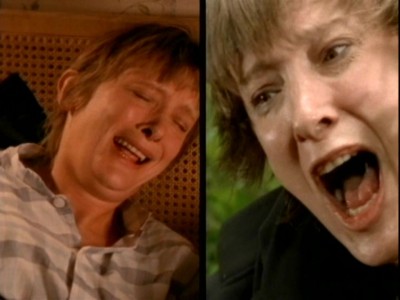
Trial and Retribution was conceived as a series of "one-off" miniseries that would appear once a year, beginning in 1997. At least for these first four shows (these are my introduction to the series), the mysteries revolve around the professional and personal lives of Detective Inspector Pat North (Kate Buffery) of the London Metropolitan Police Service, and Detective Superintendent Michael Walker (David Hayman) of the AMIP (Area Major Incident Pool) of the London MPS CID (Criminal Investigation Department). Working together on a case for the first time in series one, the two eventually become lovers and move in together, where the pressures of their respective jobs strain their already shaky relationship. Let's look at the four series.
TRIAL AND RETRIBUTION I
Five-year-old Julie Ann Harris (Millie Ricks) has gone missing from the playground outside her rundown government housing apartment building. Her pregnant mother, Anita Harris (Helen McCrory), and her violent live-in boyfriend, Peter James (Lee Ross), mount an increasingly frantic search for the little girl, but soon the police are called in. Eventually, Julie is found stuffed in a sewer drainpipe, having suffocated there after being sexually assaulted. The search headed up by DI Pat North is now turned into a murder investigated led by DS Michael Walker, a tough task-master who desperately wants to put away the murderer of this little girl.
Having little to go on, Walker and his team eventually discover that a witness, elderly Mrs. Marsh (Helena McCarthy), was overlooked in the first round of the investigation. She claims that she saw Julie leave the playground with Michael Dunn (Rhys Ifans), a drunken troublemaker who lives nearby, and who has a history of bothering children - including fondling two little girls he lived with in a foster home when he was younger. Circumstantial evidence eventually puts Dunn on trial for the murder of little Julie, with solicitor Belinda Sinclair (Anastasia Hille) convinced that since there is no actual physical evidence connecting Dunn to Julie, he's innocent. Highly regarded barrister Robert Rylands (Corin Redgrave) argues his case before the Crown court, but a series of twists and turns concerning key evidence and witnesses leaves the final verdict in doubt.SPOILERS ALERT!
What's immediately noteable about Trial and Retribution, outside of its frequent use of split-screen images (more about that later), is that the viewer is going to get plenty of time devoted to thoroughly exploring this murder investigation and subsequent trial. Anyone addicted to our Law and Order series here knows that events are tidied up rather quickly within its 50-minute timeframe. But the 200-minute movies here allow a luxury of procedural detail and character development that puts the individual Trial and Retributions closer to miniseries status, and thus deepen our involvement with the story because there's simply more of it.
What I also found fascinating about this first go-around for Trial and Retribution is screenwriters La Plante's and Vaughan Kinghan's felicity in spinning an ever-more convoluted storyline (aided by tense, atmospheric direction by Aisling Walsh) that thoroughly leaves the viewer apprehensive about who actually committed the crime. Nothing is cut and dried here, and just when you think you've got a handle on what exactly happened to little Julie, La Plante and Kinghan introduce a new, unexpected plot twist that disorients the viewer - not a bad trick when viewers have seen so many of these kinds of TV procedurals that we can usually figure them out within the first five minutes. I was also impressed with Trial and Retribution's similar bent to Law and Order, where the lead characters' private lives are left just that: private. At least for the first two series, Pat's and Mike's home lives are left in the background; their cases are everything, and the series' focus is on showing how the police, and the courts, uncover the "truth" (or a close approximation, or, terribly, not the real truth at all).
Evidently, the creator and writer of Trial and Retribution, Lynda La Plante, is somewhat defensive about the inclusion of the split-screen visual scheme that's often employed in the series (at least that's the way she comes over on the subject in an interview included on this disc set). While it's true that Trial and Retribution beat out 24 in the use of this technique in a TV thriller, it's hardly the "innovation" she claims it is. Don't get me wrong; it's used well here. While the split screen is not always as informative as she claims it is, nor not always used editorially, as in providing subtextual commentary between two images (many times it's used strictly as a visual gimmick), it does lend a visual panache to the series that nobody needs to be ashamed of, or feel the need to vigorously defend as "groundbreaking." After all, in her interview, La Plante only uses 1968's The Thomas Crown Affair as an example of the split-screen in movies - and then says it wasn't used in the same manner as her show. But she somehow forgets another movie from 1968, director Richard Fleischer's The Boston Strangler, which effectively used split-screens in precisely the same editorial manner that Trial and Retribution does, for a similar suspense thriller. Gimmick or not, the split-screen illustrates and heightens the fractured nature of La Plante's screenplays, and effectively increases the overall tension of the piece.
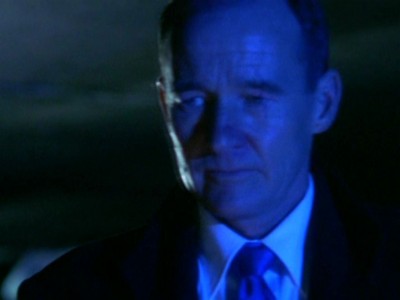
TRIAL AND RETRIBUTION II
Detectives Walker and North find themselves involved in an investigation of three horrific assaults. Two prostitutes and a schoolteacher have been sexually assaulted, then hideously mutilated, including having one of their breasts cut off. One of the prostitutes, Marilyn Spark (Linda Henry), miraculously survives the inconceivable assault, and gives valuable information about her attackers, the leader of which is eventually identified as Damon Morton (Iain Glen), a satanic businessman who holds a strange power over his three associates who are also implicated in the crime. So great is his hold over them, that all three workers confess to the crime...while categorically denying Damon had anything to do with the assaults.
Damon however is picked out of a police line-up by Marilyn Spark, and charged in the murders when a ghastly piece of evidence - a box containing the cut-off breasts of his victims - are located at his place of business. His solicitor, Corinna Maddox (Rowena Cooper), has a fierce reputation as a litigator (her nickname is "Batwoman"), while the Crown engages supercilious barrister Rupert Halliday (Simon Callow), who also enjoys a formidable reputation as a legal eagle. The case looks good to put away Damon on the murders, but of course, nothing is that simple in these films, and a series of setbacks with witnesses and alibis and evidence, put Damon's conviction in doubt.
SPOILERS ALERT!
This second effort by screenwriters La Plante and Kinghan, and director Walsh, ups the horror quotient considerably with this at times truly repulsive thriller. Oddly, though, even as the film lingers on gory autopsy photos or describes the other horrible mutilations of the victims, it doesn't feel gratuitously exploitive (the attacks are not shown on the screen). In this second Trial and Retribution, the director and screenwriters pull off a rather remarkable double effect of being both clinical in the presentation of the evidence, and deeply sympathetic and emotional when considering the effects of this case on the victims and the cops who have to solve it. There's a rather amazing scene in Trial and Retribution II where Linda Henry, playing the prostitute Marilyn who is struggling for life in her hospital bed, is trying convey to North and Walker a description of the men who attacked her. Unable to speak because, among other injuries, her throat had been slashed, an electronic device with a buzzer and red and green buttons has been rigged up by Walker so he can question her.
As Walker gets closer and closer to the truth of what happened, and Marilyn gets more and more frantic as she wordlessly tries to steer them in the right direction, the buzzer gets louder and louder, more insistent, in a beautifully directed and edited sequence that was about as riveting a piece of film as I've seen on TV in quite some time. What makes it work is not only the editing scheme, but also the sympathetic portrayal of both the cops and the prostitute, as they desperately try to help each other nail the sadistic killer who did this to Marilyn. It's a terribly sad episode, too, which one might think is unusual when the gore factor is so high (if admittedly, brief). But that's where Trial and Retribution's great strength lies: detailing a hard-core police procedural, yes. But first finding the complex human emotions that drive the mystery. Out of this set, this may be the strongest entry, and perhaps not by coincidence, the remaining two shows - without director Walsh and co-scripter Kinghan, fall somewhat short of these first two excellent outings.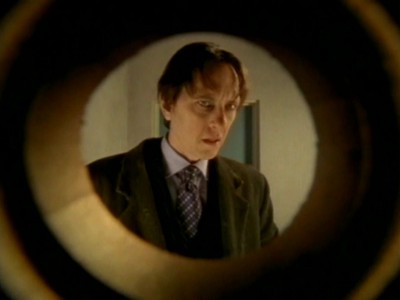
TRIAL AND RETRIBUTION III
A murder investigation into the disappearance of 15-year-old Helen Booth, a pretty blond papergirl who was abducted on her route, leads DS Walker to Karl Wilding (Anthony Higgins), a wealthy businessman who owns the boathouse where Helen's bloody clothes were found after an anonymous tip directed the police there. Meanwhile, DI North, who is moving in with Walker as his lover, becomes ensnared in the unwanted attentions of wine salesman Stephen Warrington (Richard E. Grant). Warrington, who met North over an aborted investigation into a neighboring house that Warrington suspected was used as a brothel, soon reveals himself to be an unstable stalker, a manic-depressive with wild mood swings who refuses to take his medication. Eventually, events conspire to implicate Warrington and Wilding in the murder of Helen Booth, but who actually committed the murder? The "truth" doesn't come out until after North suffers horrible emotional stress from Warrignton's pursuit - emotional turmoil that Walker is too self-involved to recognize until it's too late.
SPOILERS ALERT!
A gut-wrenching thriller fueled almost entirely by Grant's full-throttle performance as the manic-depressive stalker Warrington (is there a more skilled, more entertaining British character actor out there than Grant?), Trial and Retribution III contains scenes that really skirt the bounds of good taste, and are certainly not for the squeamish. And yet again, it's hard to cry "exploitive" when the scenes aren't included for purely prurient titillation. While I'm sure that everyone involved with the series knew how these scenes would be received (try disgust and shock), and that nobody was kidding themselves into thinking that such notoriety wouldn't translate into hype and ratings, the scenes do play as valid because they're integral to the story. While I could have done without Grant smashing a decomposed head down on North's desk, with maggots flying all over her face and hair and clothes (a truly disgusting scene), the filmmakers do use the psychological aftermath of this assault as a telling character reveal for North which graphically illustrates the intense pressures that officers in this line of work must face. Even more sickening is North's abduction by Grant, where's she's forced to uncover the body of Helen Booth - a ghastly moment that Buffery turns into a tour de force of unrelieved horror and agony.
Aside, however, from the excellent performances in Trial and Retribution III, though, this entry in the series points towards a potentially dangerous turn of focus for the show. By highlighting the romantic relationship between Walker and North, the series takes its eye off the ball as far as concentrating on the crime and punishment aspects that made Trial and Retribution so memorable in the first place. It's bad enough that the relationship is presented as already a fact with no background laid for the rather surprising pairing (Walker and North showed no such interest in the previous two films, and the actors themselves don't look like a likely couple), but then long scenes follow showing the couple having difficulty almost from the start, that play more like bad soap padding than anything else. When Grant's off the screen here, invariably the show returns to these domestic tiffs, and they get repetitive quite quickly. Unfortunately, more of the same is coming up in the next installment of Trial and Retribution.
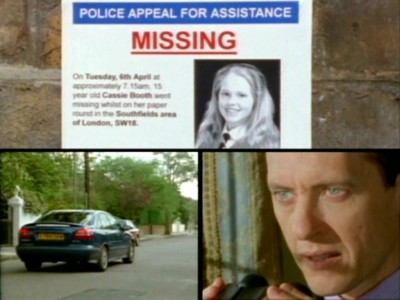
TRIAL AND RETRIBUTION IV
Events conspire to put North and Walker at loggerheads in both their personal and professional lives in this 2000 entry. An old case from Walker's past comes back to haunt him as convicted murderer James McCready (James Wilby), put away thanks to Walker's investigation, finagles a retrial due to the romantic interest of Member of Parliament and barrister Robert Rylands (Corin Redgrave). McCready was convicted of stabbing his lover Gary Meadows (Steven Hartley) in the back with a butcher knife - an act that McCready insists was a self-inflicted accident on Meadow's part. And while Meadow's daughter witnessed the act, she was only a child and now, eight years later, she's ready to testify on behalf of McCready's story.
North, meanwhile, has been selected for a fast-track promotion program for "future police leaders," and her first case is naturally, the McCready case. Although she immediately informs her superior of her relationship with Walker, she's still allowed to head up the investigation of the crime (???), with assurances that Walker isn't the subject of the reinvestigation. But of course, he soon is; McCready, with the aid of overly sensitive, overly-sexed Rylands, plans to turn Walker's original investigation into a case of sexual discrimination based on orientation, a charge that Walker sneers at. Soon, Pat and Mike at fighting both because she's investigating his potential wrongdoing, and because she's advancing in the ranks ahead of him. But will McCready get away with murder twice?
SPOILERS ALERT!
The weakest entry in this collection, Trial and Retribution IV stumbles badly because the mystery itself is weak and never really in question, and because we're further burdened with the ever-more uninteresting soap opera theatrics of Walker's and North's relationship. It's difficult to decide which aspect of this show is the weakest. The mystery itself is never in question; actor James Wilby telegraphs his performance from minute one, while the script doesn't make it too hard to figure out that he's without a doubt, guilty. The gore factor from previous Trial and Retribution entries has been eliminated (which is fine), but so has the ambiguity and complex plot structuring that made the other stories so compelling (and seriously, how ridiculous is it that North would be allowed to stay on that investigation, with her live-in lover the very subject of said investigation?).
Equally poor is the continued focus on Pat and Mike's relationship. Quite frankly by this fourth outing, I had had enough of the two characters, and wished the program had switched back to concentrating on the criminals and their investigations and trials. But unfortunately, we're stuck here with clichéd soap histrionics like Pat getting pregnant, and then miscarrying the baby. What are scenes like this doing in what was up to now, a gritty, layered police procedural? I have no idea what subsequent episodes entail, as far as the couple occupying the center of the show's attention, but frankly, it's a disastrous sidetrack at this point, one that seriously weakens this once-tough, thematically multifaceted series.

The DVD:
The Video:
My understanding is that the first two entries in the series were shot in the then-standard 1.33:1 full frame aspect ratio, and series 3 and 4 were shot widescreen. However, all four films are presented here at the standard 1.33:1 full-frame ratio. The picture can be at times, a little soft, and the colors can be muddy or slightly faded at times. Overall, though, the video transfers for Trial and Retribution - Set 1 look decent enough, if unspectacular.
The Audio:
The Dolby Digital English 2.0 audio track is adequate technically - all dialogue is clearly heard as far as levels go - but seriously, Acorn Media has to look at these English shows individually, and decide which ones need subtitling and/or close-captions. Considering the show's efforts to be as realistic as possible, there are strong local accents featured which can seem almost impenetrable to the average viewer. Acorn Media needs to offer subtitles and/or close-captions for these releases, or risk losing sales.
The Extras:
There's an interview with La Plante, from 2004, that's included here. It runs 12:26, and seems more like a plug for her place in TV history, rather than a detailed discussion of the show itself. She's particularly insistent about the split-screen, but her argument is weak. There's also a text bio of the author, along with a glossary of English law terms that is fairly useless.
Final Thoughts:
Sensational...when it sticks to crime. Trial and Retribution - Set 1 gives us the first four outings in the long-running police procedural from England, and for the most part, they're exceptionally well-plotted (by Prime Suspect creator, Lynda La Plante), directed, and performed. The long running times of these miniseries give the viewer an incredible amount of detail concerning the actual procedures of such high-profile crime investigations and their subsequent trials. Densely plotted, with complex themes concerning the crimes, the villains, and the police. Just get off Mike and Pat's romance. I highly recommend Trial and Retribution - Set 1.
Paul Mavis is an internationally published film and television historian, a member of the Online Film Critics Society, and the author of The Espionage Filmography.


|
| Popular Reviews |
| Sponsored Links |
|
|
| Sponsored Links |
|
|
| Release List | Reviews | Shop | Newsletter | Forum | DVD Giveaways | Blu-Ray | Advertise |
|
Copyright 2024 DVDTalk.com All Rights Reserved. Legal Info, Privacy Policy, Terms of Use,
Manage Preferences,
Your Privacy Choices | |||||||









